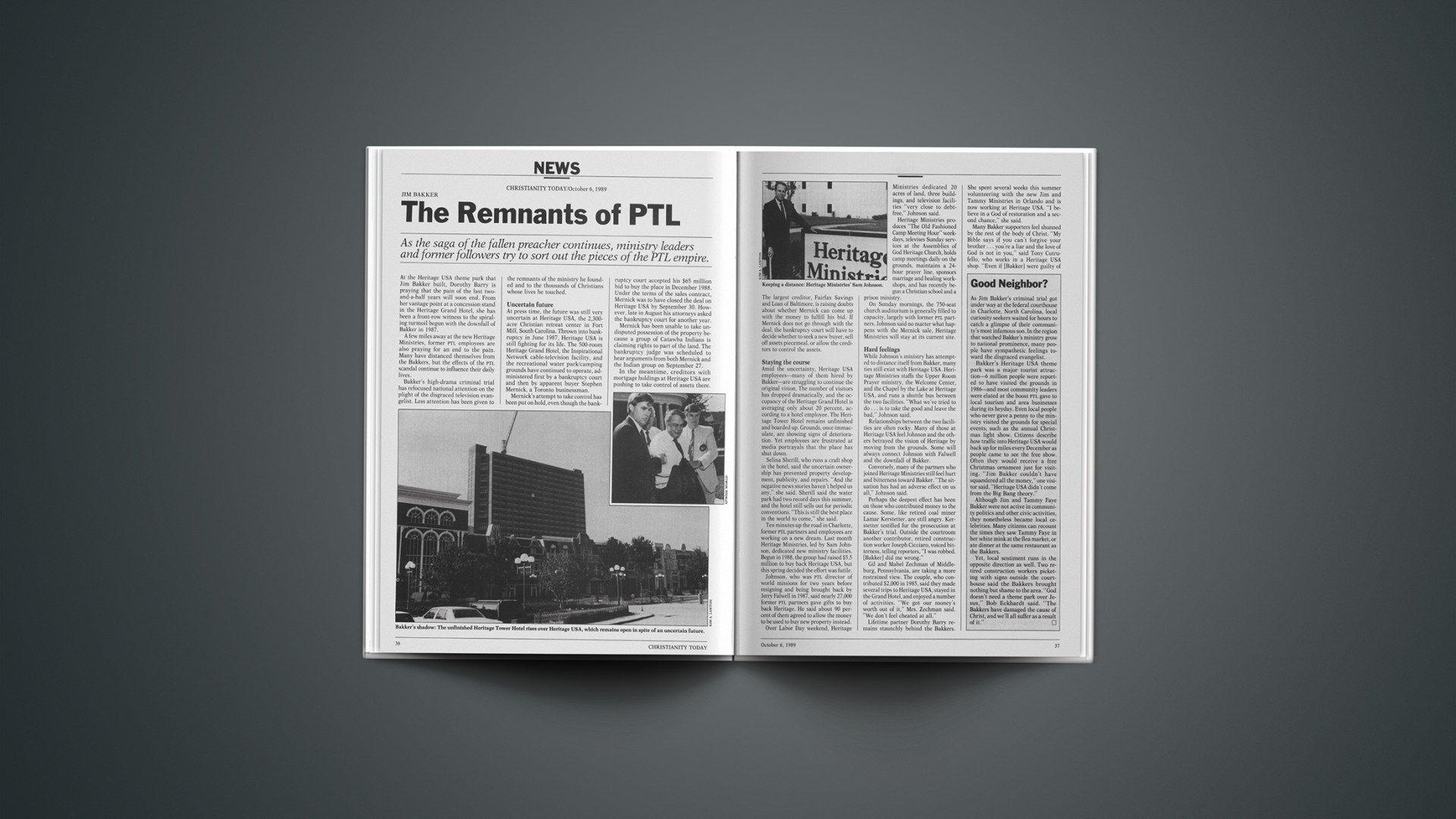As the PTL drama continues to unfold in Charlotte, North Carolina, religious broadcasters are still trying to step outside the long shadow of Jim Bakker and other scandal-ridden media ministers. Officials of the National Religious Broadcasters (NRB) admit several challenges lie ahead before they will be able to put two-and-a-half difficult years behind them.
Last month, executive director Ben Armstrong stepped down after more than 23 years at the NRB administrative helm. Armstrong, who is 66, has said he is not retiring, but is resigning to take advantage of consulting opportunities.
According to NRB President Jerry Rose, a consulting firm has been spearheading the search for Armstrong’s replacement since early spring. In the interim, Robert A. Cook, chancellor of the King’s Cook College and past president of the NRB, has been named acting executive director. Rose said a new executive director will be chosen in the next few months and installed at the annual convention in Washington, D.C., in February. Several prominent NRB members have been rumored as possible successors, but Rose declined to name any of those being considered.
Whoever fills the position will confront a host of daunting tasks, including keeping the faltering Ethics and Financial Integrity Commission [EFICOM] program on track, addressing serious budget problems, and maintaining unity in the face of growing organizational diversity and structural changes.
In the months since EFICOM was officially inaugurated, problems in implementation have continued to surface (CT, Mar. 3, 1989, p. 46). “We were overly optimistic in thinking we could put it together as quickly as we were trying to,” Rose told CHRISTIANITY TODAY. Last month, EFICOM officials decided to suspend for one year the compliance requirements for organizations with less than $500,000 in annual broadcast income.
According to EFICOM administrator Art Borden, who is also president of the Evangelical Council for Financial Accountability (ECFA), the requirements were “unnecessarily difficult” for the smaller “mom and pop” stations, which are “not the ones causing the problems anyway.” Borden said the NRB will be reworking the requirements “to make everybody accountable, but accountable within the capability of the organization.” He added that the suspension, which will affect “several hundred” members, was within EFICOM bylaws.
Another major problem for the NRB has been in determining which member organizations must comply with EFICOM standards (CT, May 12, 1989, p. 50). As of press time, 198 NRB members have been approved by EFICOM, including 96 approved because of their membership in ECFA, Borden said. However, the NRB still does not have precise statistics about which of the 825 members are for-profit corporations that do not come under EFICOM standards. More than half of the members are thought to be for-profit corporations. David Clark, NRB first vice-president, said a committee has been formed to look into setting some accountability standards for those members as well.
Nevertheless, NRB officials maintain their commitment to EFICOM. “We’re having to hammer out things that we’ve never had to before,” Rose said. “I think it’s going to help us, but it’s not easy to go through these things.”
Traumatic Years
While EFICOM is looking at the financial situation of members, the NRB has also been forced to reassess the condition of its own budget. Rose acknowledged that things are “tight financially,” and added that the group is in the process of “developing a short-term plan to tighten things up and correct the situation.” A long-term budget will be worked out with the new executive director, he said.
Rose blames the recent televangelist scandals for the financial difficulties. “I don’t think any association that represents Christian radio and television broadcasters could have come through the last two years without feeling the brunt of Rose it,” he said. “We’ve been through two of the most traumatic years in the history of Christian broadcasting.”
The new emphasis on accountability has been a shift in focus for the NRB, which was founded to provide religious broadcasters with a unified push for open access to the airwaves and spiritual fellowship. As religious broadcasting has become a multibillion-dollar industry, the NRB is being forced to address the changing needs of its diverse members, according to Clark, who is also dean of the School of Communication at CBN University.
Clark said “friendly tensions” have arisen between station owners and program producers, between those who view the group as a spiritual enhancer and those who see it as a trade association, “old-line” evangelicals and new members, charismatics and noncharismatics, and radio organizations and television ministries. But Clark said he believes those tensions have been “healthy in a creative sense.”
Rose believes the challenges facing the NRB will ultimately result in a stronger organization. “Transitions are generally difficult,” he said. “There are forces that have come against us in the last couple of years that could have had a very negative impact, but when it’s all said and done, I believe it’s going to end up positive.”










